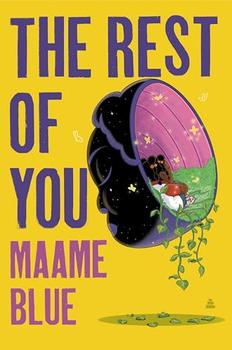Summary | Excerpt | Reading Guide | Reviews | Beyond the Book | Readalikes | Genres & Themes | Author Bio

Fiction
by Jocelyn Nicole JohnsonCONTROL NEGRO
By the time you read this, you may have figured it out. Perhaps your mother told you, though she was only privy to my timeworn thesis—never to my aim or full intention. Still, maybe the truth of it breached your insides:
That I am your father, that you are my son.
In these typewritten pages I mean to make manifest the truth, the whole. But please do not mistake this letter for some manner of veiled confession. I cannot afford to be sorry, not for any of it. I hope you'll come to understand, it was all for a grander good.
You see, I needed a Control Negro, grotesque as that may sound—
You should know I was there on the day you were born, a reflection behind the nursery glass. I laid eyes on you while your mother rested, along with her husband—that man you must have accepted, at least for a time, as your father. You seemed to see me too, my blurred silhouette. Your birth (natural, vaginal) took place at the university's teaching hospital. I noted your weight (7 lb., 7 oz.), your color (dark and florid), your temperament (outwardly placid)—like mine.
I assisted with payment for your daycare as well, when you were so small, still in those plush white Pampers. The facility sat at the edge of campus. So graduate students, like your mother, could enroll their young children while they worked or studied. And faculty, like me, could take guided tours and observe through mirrored one-way glass. I took mental notes on the room of children, a rainbow of faces, but my eyes hung on you: your mahogany skin and dark, keen eyes. Your fat, curled fingers grasping at blocks, trying to build something sturdy and true. I grew skilled at enduring the feeling you inspired, a seeping pride that filled my chest, then spilled into a painful ache.
Remember your season of Little League games, the ones at Washington Park, just down from the bus stop? I could always spot you, especially at a distance. You'd be standing at the plate, arms angled, aiming for the bright white ball, determined to hit it past every boundary we could see.
What I mean to say is that all this time I've watched you, or else had others watch in my stead. My TA did a practicum with your sixth-grade civics teacher. One of my graduate students tutored you in middle school at my suggestion that he "give something back." He shared anecdotes of your progress, never suspecting that you were mine. Your sophomore year, I hired a college student, a young man of legal age but slight enough to pass for seventeen. You knew him as David from the neighboring county. Under my direction he befriended you, prodded you toward swimming (and away from the fraught cliché of basketball). He ferried me printouts of your correspondence, revealing your vernacular speech, the slant of your smile in cell phone pictures. Hearing this now, you might feel manipulated, violated even. But I am almost certain that my determination to shape and groom, my attempts and failures to protect, aren't terribly different from those of any other parent.
Everyone has an origin story and this is yours: You began as a thought fully formed and sprung from my head. No, you were more like a determined line of questions marching altogether toward a momentous thrashing. It was 1985, years before you were born, and I'd just come to work here on this campus. Mother died at the start of fall semester, her body inundated with cancer, undiagnosed until she had passed. Numb, I traveled south to bury her, missing the initiation of my own first classes, returning as promptly as I could. I was only away for a week and a day, but a cold snap had scattered leaves onto the great lawn. My first afternoon back, I walked over to my office and was straightening the objects on my desk, my shirtsleeves rolled up, my back to the door. A man walked in and he startled when I turned to face him, so I startled too. He was—I learned a few minutes later—a senior colleague from my own department: history. He'd been away on sabbatical and had come to my office to welcome me. "Sorry," he said. "I'm looking for a Professor Adams. Do you know where I can find him, buddy?" I realized what was happening a moment before he did, and forced myself to laugh, to try to put him at ease, though I fear my laughter came out as a strangled sound. You see, he'd mistaken me for one of the evening janitors.
Excerpted from My Monticello by Steven Johnson. Copyright © 2021 by Steven Johnson. Excerpted by permission of Henry Holt and Company. All rights reserved. No part of this excerpt may be reproduced or reprinted without permission in writing from the publisher.




Knowledge is of two kinds. We know a subject ourselves, or we know where we can find information on it.
Click Here to find out who said this, as well as discovering other famous literary quotes!
Your guide toexceptional books
BookBrowse seeks out and recommends the best in contemporary fiction and nonfiction—books that not only engage and entertain but also deepen our understanding of ourselves and the world around us.